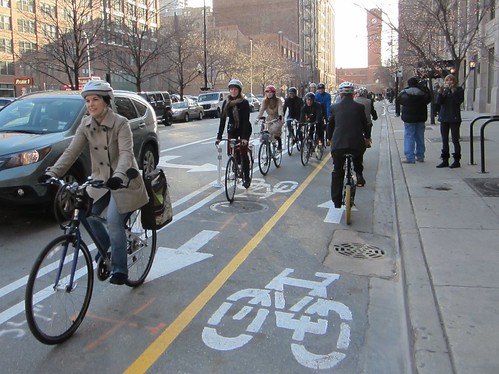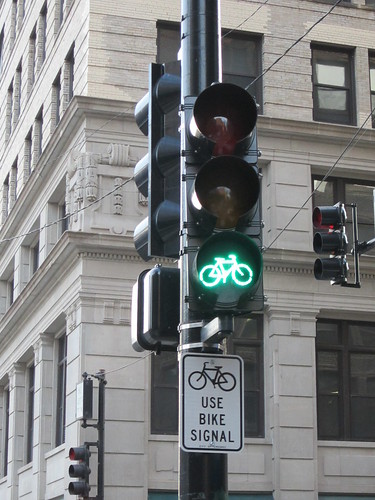A great day in Chicago: protected lanes open in the heart of the Loop
See more of John’s photos from the ribbon cutting and inaugural bike ride, as well asSteven’s photos from the event.
This afternoon when Mayor Rahm Emanuel opened the new two-way protected bicycle lanes on Dearborn Street, it was the exclamation point to a memorable year of bike improvements. Dozens of advocates gathered at the south end of the 1.2-mile greenway for the event, which also celebrated Chicago’s reaching a total of thirty miles of protected and buffered lanes citywide, plus the release of the Streets for Cycling Plan 2020.
The “game-changing” lanes on Dearborn, running the length of the Loop central business district, create a car-free route that even novice cyclists will feel comfortable on. They also make a statement that the city is serious about getting more Chicagoans on bikes. Building the lanes involved converting one of the three car travel lanes on the northbound street, which has the additional benefits of reducing speeding and shortening pedestrian crossing distances. Car parking was moved to the right side of the bike lanes, providing protection from moving vehicles, and dedicated bike stoplights, a first in Chicago, guide southbound cyclists and prevent conflicts between cycles and left-turning autos.
The thirty-mile landmark means that Chicago is well on its way towards the city’s stated goal of building 110 miles of protected bike lanes and forty miles of buffered lanes by the end of Emanuel’s first term in 2015. The Streets for Cycling Plan details the Chicago’s strategy to create a 645-mile network of on-street bike routes by the end of this decade, with the goal of providing a bikeway within a half-mile of every resident.
See more of John’s photos from the ribbon cutting and inaugural bike ride, as well asSteven’s photos from the event.
This afternoon when Mayor Rahm Emanuel opened the new two-way protected bicycle lanes on Dearborn Street, it was the exclamation point to a memorable year of bike improvements. Dozens of advocates gathered at the south end of the 1.2-mile greenway for the event, which also celebrated Chicago’s reaching a total of thirty miles of protected and buffered lanes citywide, plus the release of the Streets for Cycling Plan 2020.
The “game-changing” lanes on Dearborn, running the length of the Loop central business district, create a car-free route that even novice cyclists will feel comfortable on. They also make a statement that the city is serious about getting more Chicagoans on bikes. Building the lanes involved converting one of the three car travel lanes on the northbound street, which has the additional benefits of reducing speeding and shortening pedestrian crossing distances. Car parking was moved to the right side of the bike lanes, providing protection from moving vehicles, and dedicated bike stoplights, a first in Chicago, guide southbound cyclists and prevent conflicts between cycles and left-turning autos.
The thirty-mile landmark means that Chicago is well on its way towards the city’s stated goal of building 110 miles of protected bike lanes and forty miles of buffered lanes by the end of Emanuel’s first term in 2015. The Streets for Cycling Plan details the Chicago’s strategy to create a 645-mile network of on-street bike routes by the end of this decade, with the goal of providing a bikeway within a half-mile of every resident.


